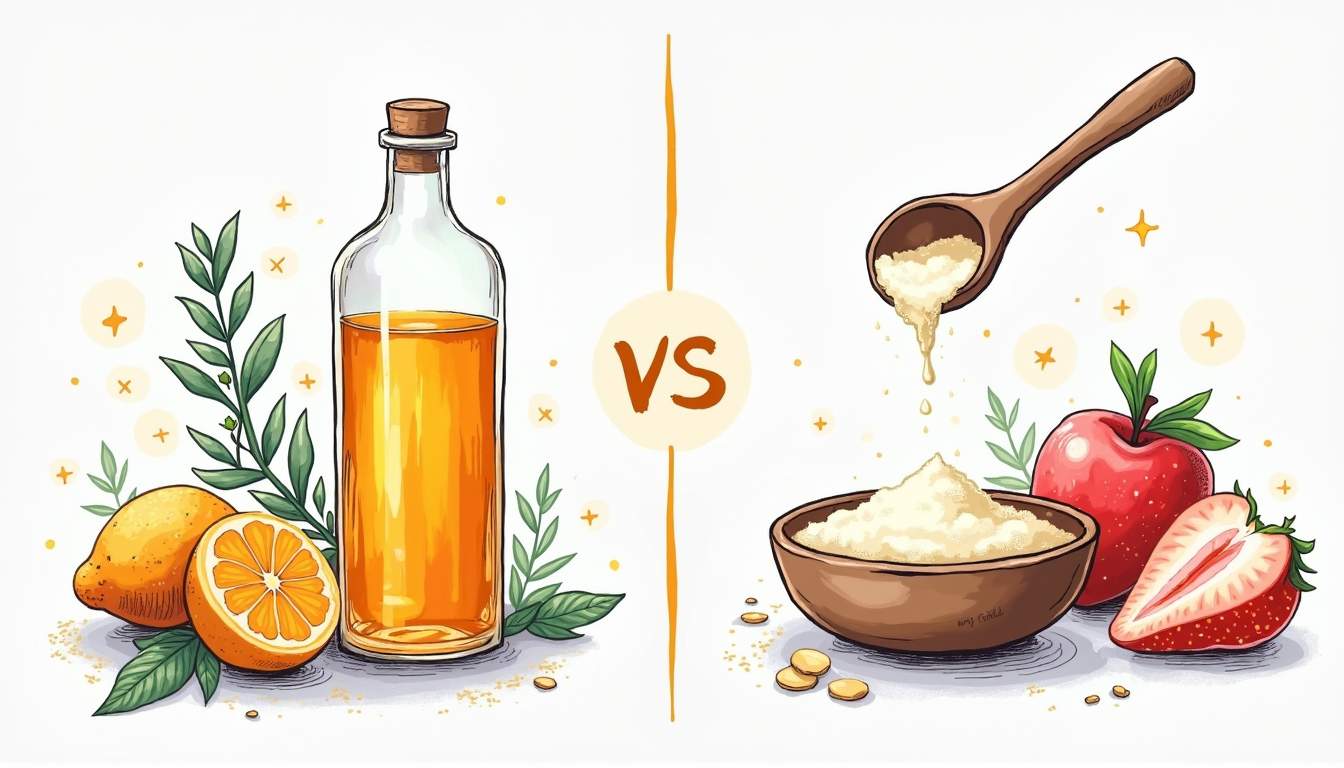Liquid collagen and powder collagen supplements have gained immense popularity in recent years, touted for their potential benefits in promoting skin elasticity, joint health, and overall wellness. As consumers become more health-conscious, understanding the differences between these two forms of collagen is crucial for making informed choices. This article explores the nuances of liquid and powder collagen, comparing their benefits, effectiveness, and suitability for various lifestyles.
Liquid collagen offers quicker absorption, making it ideal for fast results in skin hydration and joint health. Powder collagen provides versatility, easily added to foods and beverages, making it cost-effective for long-term use. Choosing between them depends on personal lifestyle, preferences, and specific health goals.
Understanding Collagen Supplements: Liquid vs Powder
Composition and Ingredient Differences
Collagen is a vital protein that plays a significant role in maintaining the structure and integrity of skin, bones, and connective tissues. Both liquid and powder collagen supplements are derived from similar sources, including bovine, marine, or porcine collagen. However, the processing methods can differ significantly. Liquid collagen is often hydrolyzed, meaning it has been broken down into smaller peptides for easier absorption. This process can make liquid collagen more bioavailable, allowing the body to utilize it more efficiently.
On the other hand, powdered collagen typically comes in a dehydrated form that requires mixing with a liquid before consumption. While both forms contain essential amino acids, the specific composition can vary based on the source and processing methods. Some powders may include additional vitamins and minerals, while liquid forms may be flavored or sweetened to enhance palatability. Furthermore, the choice of source can influence the type of collagen present; for instance, marine collagen is often touted for its superior absorption rates and is a popular choice among those seeking skin health benefits, while bovine collagen is rich in type I and type III collagen, which are essential for skin and joint health.
Bioavailability and Absorption Rates
Bioavailability refers to the proportion of a nutrient that is absorbed and utilized by the body. One of the key advantages of liquid collagen is its higher bioavailability compared to powder. Studies suggest that liquid collagen may be absorbed more quickly and efficiently, leading to faster results in skin hydration and elasticity.
Conversely, powdered collagen requires the digestive system to break it down before the body can absorb it. This process can take longer, which may delay the onset of benefits. However, some individuals may prefer powder due to its versatility; it can be easily added to smoothies, baked goods, or other recipes, making it a convenient option for those who enjoy cooking or want to incorporate collagen into their daily diet. Additionally, powdered collagen often comes in unflavored varieties, allowing for seamless integration into a variety of dishes without altering the taste. This adaptability can be particularly appealing for those who are mindful of their dietary preferences or restrictions, as it provides a way to boost collagen intake without the need for specialized supplements.
Comparing Benefits and Effectiveness
Skin, Hair, and Nail Improvements
Both liquid and powder collagen supplements have been linked to improvements in skin, hair, and nail health. Collagen is known to enhance skin elasticity, hydration, and overall appearance. Many users report a reduction in wrinkles and fine lines after consistent use of collagen supplements.
Liquid collagen, with its higher absorption rates, may provide quicker results in skin health. Users often notice improvements in skin texture and hydration within a few weeks. Powdered collagen, while effective, may take a bit longer to show similar benefits, depending on individual metabolism and dietary habits. Additionally, collagen supplements can help stimulate the body's natural collagen production, which tends to decline with age. This stimulation can lead to not only a more youthful appearance but also stronger hair and nails, making them less prone to breakage. Many users also appreciate the added benefit of improved hair thickness and shine, which can be attributed to the amino acids present in collagen that are essential for keratin production.
Joint Health and Mobility Support
Collagen is also crucial for joint health, as it helps maintain cartilage and connective tissues. Both liquid and powder forms can support joint mobility and reduce discomfort associated with aging or physical activity. Studies have shown that collagen supplementation can help alleviate joint pain and improve overall mobility.
For those specifically targeting joint health, liquid collagen may offer an edge due to its faster absorption. However, powdered collagen can still be effective, especially when consumed regularly. The choice between the two may come down to personal preference and lifestyle factors. Furthermore, some users combine collagen supplements with other joint-supporting nutrients, such as glucosamine and chondroitin, to enhance their effects. This combination can provide a more comprehensive approach to joint health, addressing not only pain relief but also the underlying structural integrity of the joints. Regular exercise, along with a balanced diet rich in antioxidants and omega-3 fatty acids, can further complement the benefits of collagen supplementation, leading to improved overall joint function and mobility over time.
Making the Right Choice for Your Needs
Lifestyle Considerations and Ease of Use
When deciding between liquid and powder collagen, lifestyle considerations play a pivotal role. Liquid collagen is often favored for its convenience. It typically comes in pre-measured doses, making it easy to incorporate into a daily routine without the need for mixing or measuring. This can be particularly appealing for individuals with busy schedules or those who travel frequently. The portability of liquid collagen also allows for on-the-go consumption, whether it’s during a hectic morning commute or while enjoying a lunch break at work.

Powdered collagen, while requiring a bit more preparation, offers versatility. It can be added to a variety of foods and beverages, allowing for creative culinary uses. For those who enjoy cooking or want to enhance their meals with additional nutrients, powdered collagen can be an excellent choice. Imagine stirring a scoop of collagen powder into your morning smoothie, or mixing it into your favorite soup or sauce for an extra protein boost. This adaptability not only helps in maintaining a diverse diet but also encourages experimentation in the kitchen, making healthy eating both enjoyable and fulfilling.
Cost Analysis and Long-term Value
Cost is another important factor when comparing liquid and powdered collagen. Generally, liquid collagen tends to be more expensive per serving than powdered forms. This price difference can be attributed to the manufacturing processes and packaging. However, the long-term value of either form depends on individual usage and health goals. It’s worth noting that while the initial investment in liquid collagen may be higher, many users report quicker visible results, which can be a motivating factor for those eager to see improvements in skin elasticity or joint health.
For individuals seeking rapid results, liquid collagen may justify the higher cost. However, for those who are budget-conscious or prefer a more economical option, powdered collagen can provide similar benefits over time, especially when incorporated into a balanced diet. Additionally, the larger containers in which powdered collagen is often sold can lead to significant savings in the long run. Many brands also offer subscription services, allowing consumers to stock up on their preferred collagen type at a reduced price, ensuring they never run out while keeping their budget in check.
Conclusion
Ultimately, the choice between liquid and powdered collagen supplements depends on individual preferences, lifestyle, and health goals. Both forms offer unique benefits, and understanding their differences can help consumers make informed decisions. Whether opting for the quick absorption of liquid collagen or the versatility of powdered collagen, incorporating collagen into a daily routine can lead to improved skin, hair, nail, and joint health.

As with any supplement, it's essential to consult with a healthcare professional before starting a new regimen, especially for those with underlying health conditions or specific dietary needs. By considering personal preferences and health objectives, individuals can choose the collagen supplement that best fits their lifestyle and enhances their overall well-being.

Share:
Vitamins for Hormonal Balance: Top Supplements for Men & Women
Top Vitamins for Boosting Energy and Reducing Fatigue Naturally